- Home
- Peter S. Beagle
The Folk Of The Air Page 13
The Folk Of The Air Read online
Page 13
Oh, dear God, I have done it again. The gift is absolutely intact, I’ve done it again. He concentrated intensely on scratching Briseis’ ears, hearing himself mumble, “I believe it, I mean, we were in a play together one time, The Three Sisters, and Ben just vanished into his part, Tusenbach, didn’t break character for weeks, I mean even after the play. Tusenbach can be a real pain in the ass at a party.” What is it with me and weirdness, how do we find each other? Damn, you’d think one of us would grow out of it.
“Come and sit down, Joe.” It was a command, though her voice remained low. She took his hand and led him to the couch, while he added hopelessly, “I was Chebutykin. The old guy.” Sia pushed him down firmly and sat across from him on a footstool, shoulders hunched and her hands hanging between her thighs. Except for the bright regard, gray as the moon, she looked like a sexless peasant sullenly working up to the effort of spitting into the fire. Maybe it’s Egil Eyvindsson who sleeps with her. Ben probably doesn’t have the least idea.
“How far they go back together, I cannot tell you,” she said. “You know more than I do. Did Ben speak of him, do you remember him saying the name, even once?” Farrell was shaking his head, but she went on. “You played games, you used to make up voices, imaginary people; I have seen you do it. There was never a voice that could have been Egil?”
“Lord, no,” Farrell said. “We did silly stuff, bus-ride routines, something to do waiting for the subway at two in the morning. You’re talking about multiple personalities, you’re talking about some kind of possession. It’s not the same thing.”
“What do you know about possession?” Her tone was suddenly so quick and blunt that he was sure he had angered her.
He answered placatingly, “Not much. I’ve never seen any devils come out of people’s mouths, but I did know a Chinese guy in Hawaii who died, and his spirit went into a jeep.” Sia growled softly, and Farrell corrected himself. “Actually, I really knew his nephew, it was his nephew’s jeep. And I met a man back in New York who used to get taken over by Jane Austen twice a week. Mondays and Thursdays, I think it was. He’d call me up at all hours and read me whole chunks of this novel she was writing through him. Really sounded a lot like Jane Austen.”
After a long moment the growl turned into a harsh chuckle, and she said, “I believe you. Those stories are so incredibly stupid that I must believe you completely. But I would be much more interested if your friend had been the one to possess Jane Austen, so that she began to write like him. Did you ever hear of anything like that?”
“No, of course not.” He was strangely disconcerted by the idea; it made him physically giddy to think about it. “You can’t have backward possession, retroactive possession; that’s just silly, it couldn’t work like that. You couldn’t have it…
“Tell Ben,” she said, and it was at that moment that Briseis, sprawled absurdly on her back before the fire, eyes shut tight and one foreleg pointing straight up at the ceiling, began to make the most terrifying sound that Farrell had ever heard an animal make. So high and cold and distant as hardly to be a cry of flesh at all, it was almost visible to Farrell—a petal-thin wire, coated and edged with powdered glass, like the strings of Asian fighting kites, spinning out of the dog’s intestines to haul her, step by agonizedly mincing step, toward the front door, as if the other end were in the grip of the darkness beyond. Her neck was wrenched sideways and back, and she stared unbelievingly at Sia as she howled.
Sia was on her feet before Farrell had finished saying, “Jesus, what the hell?” Facing the door, she uttered a wordless cry of her own, raw and piercing enough to make the living room windows buzz and the old spears murmur hoarsely together in their wicker basket. There was no answer from outside, but Briseis abruptly gasped and toppled over, scrambling up instantly to vanish into the broom closet, where she remained for the next twenty-four hours. Sia never looked after her; rather, she raised her left hand slowly to her breast in a gesture of silent-movie shock and wonder. She stood unsteadily, rocking very slightly.
“You,” she said, softly but very clearly. “Thou.” She shook her head once and said something in a language full of creaking, snapping sounds. In English she added, “You cannot come in here. You still cannot come in.” The doorbell chimed while she was speaking, followed by Aiffe’s unmistakable splintery giggle. “Special delivery. Hey, somebody has to sign for this package.” Something heavy thumped against the door, then slid partway down.
Without moving or turning her head, Sia motioned Farrell to the door. He could hear Aiffe snickering impatiently as he crossed the room and, under that, the little shivery rustle of a desperate voice talking to itself. The words were impossible to distinguish, but Farrell did not need to.
When he opened the door, Ben fell across his feet, curling up convulsively as he did so. The crested helmet was gone, along with the belt-axe and the copper ornaments, and the torn black mantle was as mud-caked as his hair. Farrell crouched beside him, feeling for bruises and worse, relieved to find that the blood drying on Ben’s face came only from a couple of long bramble scratches. Ben opened his eyes, and Farrell drew back momentarily from the helplessly murderous gaze of a mad stranger. Then it went out, as suddenly as whatever held Briseis had released her, and Ben said calmly, “The birds were freezing,” just before he threw up a weak orange trickle over Farrell’s shoes and fainted.
“We found him in the park,” Aiffe said. “Right up by the merry-go-round, you know, the playground. He was climbing around on things and yelling.” Farrell looked up at her as he wiped Ben’s mouth with his handkerchief. She stood directly under the porch light, thumbs hooked into her jeans pockets, all her weight canted onto one flat hip, and a warily mocking grin stuttering across her face like a lit fuse. She was wearing sneakers, a denim vest, and a pale green T-shirt with the legend WHEN ALL ELSE FAILS, HUG YOUR TEDDY. “I think it’s a blood sugar thing,” she offered. “They’re finding out now that a whole lot of people get really weird when their blood sugar drops.”
Farrell said, “You know it’s got nothing to do with his damn sugar content. What did you do, mug him? What did you do to him?”
The grin fizzed a moment longer, then exploded into a fireball of defiant delight. “You can’t talk to me like that anymore. Nobody can.” She took a step toward him, shaking with the violence of her exaltation. “I’m Aiffe, and I can say whatever I want, because I can do whatever I want. And you can’t, so you don’t talk to me like I’m nothing, a baby, a nothing. You just watch your tone, and you just try really, really hard to make friends with me. Because it makes a difference if I’m your friend or not.” Her smile burned more trimphantly with each word, but Farrell saw tears in her eyes.
Behind him Sia said, “Joe, take Ben inside.” Her voice was the small stone voice that Farrell remembered from the afternoon when McManus came drunk to the house. He put his arms clumsily under Ben and half dragged, half rolled him through the doorway. Glancing sideways, he saw Sia’s stumpy legs move past to halt on the threshold, spreading to brace themselves so squarely and precisely that her house slippers did not protrude even an inch over the sill. She spoke again in the language that sounded like wind in the rigging; and from the delicate spring night, Nicholas Bonner’s sweet, sweet laughter answered her.
“Speak English, cookie,” he advised her, shrugging himself out of the porch shadows as he strolled forward. Dressed like Aiffe in jeans and a T-shirt—his was black, with a silversparkling face of Willie Nelson—he looked younger and more vulnerable than she, almost shy. He said thoughtfully, “Now why should I be so quick with any new human tongue, when you can’t ever learn to speak even one quite properly? Why should that be, after all?” There was no mockery in his voice, but a strangely companionable wonder.
Ben stirred and whispered in Farrell’s arms, his whole body abruptly dank with sweat. Sia said, “You learn. I make. I have created languages that were dust in the mouths of skulls before you were born. Have you forgotten? The gift you
have was an apology, because you have nothing of your own. Have you forgotten, then?”
“I forget nothing,” Nicholas Bonner said mildly. “I don’t think I can.” He kept his eyes down, letting the thick bronze lashes hide them. Aiffe draped herself against him, preening on his shoulder with the air of a movie gangster’s showgirl mistress. “Nick’s staying at my house,” she announced. “Private tutor, hey, hey.”
Neither Sia nor Nicholas Bonner seemed to have heard her. Sia made a sound in her throat like hard snow underfoot. She said, “In Augsburg. I thought that was the last time.”
“Well, you always did underestimate me, admit it.” His speech had lost every trace of another time or place; only the hungry humor remained, so cold that it glowed and danced like little deep-sea fish.
Ben was blinking and coughing now, trying to sit up, as Sia answered, “No, never you. Human stupidity, human longing, human madness, I have underestimated those forever.” The last word was a flinty whisper, all but inaudible.
Aiffe said, “He’s just here because of me. I brought him here, he’s staying at my house.” Pettishly playful, she tugged lightly at Nicholas Bonner’s arm with both hands.
Farrell said loudly, “I’ll get Ben on upstairs.”
Sia never turned. Nicholas Bonner and she stood together in a shifting circle of light, and Farrell knew, as he knew nothing else in that moment, that past the circle’s edge nothing existed—not himself, not whining Aiffe, not even a hurt, half-conscious Ben, muttering her name over and over like a penance. If he stops doing that, what happens? Don’t stop, don’t let her forget about us.
The boy’s golden head lifted, and the transparent, insatiable, monstrously despairing eyes of Nicholas Bonner came to bear on Sia across the bright circle. “I always return where you are,” he said. “Every time. Have you ever noticed that?” She did not answer, and Nicholas Bonner smiled. “And each time you’re that much weaker, that much more imaginary. I could walk into your house now, if I wanted to.”
Astonishingly Sia laughed then, no shotgun snort, but a rich, singing chuckle of seductive contempt. “You? Idiot wizards, drunken priests, any tinker woman with a grudge can banish you from this world; any spiteful child can call you back again. The yo-yo of the universe!” Farrell, struggling to keep Ben on his feet, almost dropped him at that comment. Sia said, “In my house, you? To walk through my shadow would destroy you.” She added something in the wind-language, and Farrell wondered if she were calling Nicholas Bonner by his real name.
Aiffe, who had been gaping in growing resentment from one to the other of them, suddenly pushed past Nicholas Bonner into the light. Or at least she tried to; it seemed to Farrell that the circle’s edge withdrew from her, slipping just far enough out of her reach to make her lurch clumsily after it, like that circus clown who used to keep trying to sweep up the spotlight. Even standing directly between Sia and Nicholas Bonner, thin face reddening, shoulders twisted, she was somehow further outside their concern than before, not merely nonexistent but impossible. She said to Sia, “Wait a damn minute, okay? Now. Who the fuck do you think you are?”
She blocked Farrell’s view of Nicholas Bonner, but he felt the hot smile spreading on his skin. The boy said straight through her, gently, humbly, “Well, then you’ll have to come out to me. Come out of your house and talk to me, old love.”
For a moment Farrell thought that she would actually do it. The thick figure tautened, the grizzled hair flared in its silver ring like a cobra’s hood, and Farrell found that he was sagging marrowless against Ben as the fire in the living room coughed and went out and an inhalation all around him set every door in the house slamming. Very far away, Sia lifted a bunny-slippered foot from the threshold and Aiffe shuddered to her knees; but Nicholas Bonner stood still, the slight body thrumming only a little, like a knife struck into a tabletop. When Sia put her foot down again, not a fraction further into the night than before, Nicholas Bonner winked at her, and the wink made a clicking, toothy sound, although Farrell knew that it couldn’t. Too empty even to fall, he heard Ben whispering, “Sia. Sia. Sia. Sia. Sia.”
Almost as softly, Nicholas Bonner said, “But you can’t, can you? My poor friend, you’re trapped in there. All your beautiful names, all those journeys, those glorious dwellings, all your empire, and just see what it’s come to.” And he clucked his tongue in perfect parody of sorrowful human relish. “Here you are, ruling over your last two lovers and a dog in a house like a stork’s nest, and your power stops at your front door.” He stretched his arms wide, wriggling his fingers elaborately, making Willie Nelson grin sequins. He said, “But I wonder if I do.”
Ben said clearly, “Prester John, she knows,” pointed more or less at Aiffe, and fell down with the effort. Aiffe moved to Nicholas Bonner’s side, visibly trembling and so pale that her eyes had gone entirely green, the bright, shallow applegreen of a hurricane sky. Nicholas Bonner put his arm around her without looking at her. He took a slow step toward Sia and then another, bringing the girl with him.
The old woman in the doorway said, “If you come any closer, I will not exile you again. Instead, I will change you.”
Nicholas Bonner stopped where he was. His laughter broke over her, smoky-cold as the fumes of dry ice. “What I am doesn’t change. Who should know that better than you?” He cocked his head, brazenly quizzical, but there was something surprisingly like wariness in the melting voice, something that remembered pain. “You saw to it yourself. I cannot be changed.”
“Not for the better,” she said. “That was always beyond me, from the first. But I can make you worse than you are.” She did not raise her own voice, but the hair stirred along Farrell’s forearms. Sia said, “Try, then.”
The boy did not move. “Try it, try it, put ‘em up,” he mimicked her. “Old love, even at your best, even when you were really somebody, the most you could ever do to me was to push me off the sidewalk for a little while. What do you think you matter now, when you don’t dare stick a toe out of your burrow? A traffic light has more power over me than you do, in this world.”
“Yes?” The single flat syllable cracked and sparked with derision like static electricity. “Well, you might be right. I am certainly less than I was, no hiding that. But if you stick a toe into my house, I will think about you in a certain way, and you will never be able to wear beauty again, whatever form you may take. And who would pay the least heed to you then, or believe that you have any power at all, in this world?”
For a moment Nicholas Bonner’s face became as pitilessly lonely as his eyes. He gripped Aiffe’s shoulders until she yelped and swung her in front of him, saying in a light, careful voice, “Do it the way I showed you. Do it now.”
Aiffe wriggled under his arm, refusing to look straight at Sia. “Nick, let’s go, I need some more practice, okay?” Her acne patches were boiling up like stigmata.
“Focus,” the boy said. “You can do it, it’s just focusing. Just like in the park, exactly the same, now.” He turned her body between his hands with a raging precision, aiming her. She neither resisted nor cooperated, but kept whimpering, “Nick, I want to go, let’s go home.” Nicholas Bonner took hold of her limp arm, holding it out, making her point at Sia.
Farrell gave up trying to lift Ben and began hauling him away from the door. He heard Sia’s voice, full of a terrifying pity, “Child, no,” and the boy saying, “Now,” as the air suddenly smelled violently of lightning and the vast inhalation happened a second time. Farrell scrambled toward the stairs, feeling the old house lunging and aching in the ground, while the walls curtsied slowly to each other and the chess table, the chairs, and the fire tongs hurtled into his legs. He held fast to Ben, pulling against a power like the disemboweling undertow of a sinking ship. The floor seemed to be slanting steeply under him, and he knew that he heard the girl cry out in bitter shock and pain, a chattering moan that laid Farrell’s spine bare. But it was Nicholas Bonner’s voice, not hers; and with that, chaos came to an end almo
st as confounding as itself. In the tumbled, freezing house, the only sound was Sia’s rasping sigh. Ben had finally stopped saying her name.
“You see,” she said without triumph. “You cannot come in. Not even with her to make the way.”
Aiffe was almost doubled over Nicholas Bonner’s supporting arms, her mouth wrenched up at one corner like a hooked fish. Farrell half expected to see the boy drop her; but the dreadfully perfect face had already smoothed itself back into a bright mask of pleasure, and Nicholas Bonner held Aiffe most gently, stroking her shoulders, drawing his fingers down the back of her neck. He was murmuring to her, so quietly that Farrell could not hear the sound of the words.
“She is not harmed,” Sia said. “Take her home. And if there is any mercy in you, any—” She struggled briefly to say something that could not even be thought in English, then used a phrase in the wind-language. “—then leave her there, leave her alone. She can never do what you want; she has not that kind of power. You have made a mistake about her. Let her go.”
Ben was sitting up with Farrell’s aid, speaking calmly and rather cheerfully in Old Norse. The lights of a passing car swam over the porch, and Farrell saw Nicholas Bonner carefully lift Aiffe and turn her toward him to lean her head on his chest. He smiled at her with something so much like tenderness that it chilled Farrell’s heart twice over: once because in that moment the boy looked like someone who had always loved Aiffe deeply; and again because Farrell had no doubt that that particular smile was Nicholas Bonner’s top-of-the-line model, the very best he could ever do. A dark splotch was spreading slowly on the girl’s jeans, and Farrell realized that she had wet herself.
Nicholas Bonner raised his clear eyes to Sia. He said, “But it’s what she wants. She called me here, she asked for my guidance—demanded it, really—and if I left her now, she’d come right after me, she’d come looking.” He chuckled fondly, caressing Aiffe’s matted hair. “Oh, and you would find me, too,” he praised her, slipping into a baby-talk singsong. “Oh, yes, yes, she would, of course you would.” He might have been crooning to a wriggly puppy.

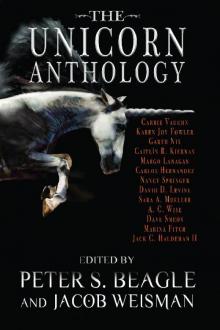 The Unicorn Anthology.indb
The Unicorn Anthology.indb Sleight of Hand
Sleight of Hand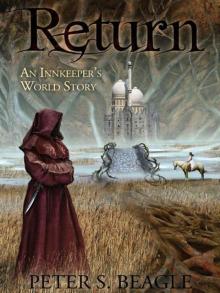 Return
Return The Last Unicorn
The Last Unicorn Two Hearts
Two Hearts Mirror Kingdoms: The Best of Peter S. Beagle
Mirror Kingdoms: The Best of Peter S. Beagle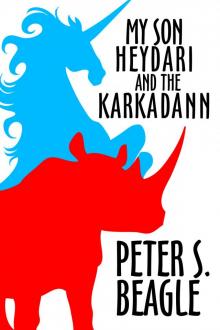 My Son Heydari and the Karkadann
My Son Heydari and the Karkadann The Magician of Karakosk, and Other Stories
The Magician of Karakosk, and Other Stories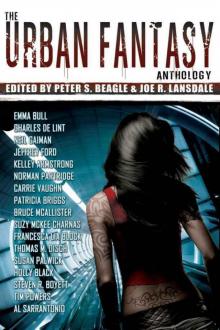 The Urban Fantasy Anthology
The Urban Fantasy Anthology The Story of Kao Yu
The Story of Kao Yu The Karkadann Triangle
The Karkadann Triangle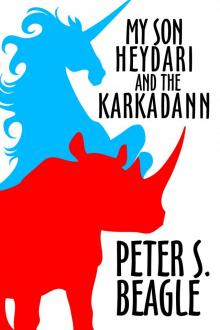 My Son and the Karkadann
My Son and the Karkadann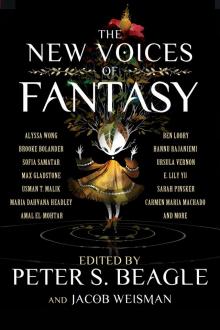 The New Voices of Fantasy
The New Voices of Fantasy A Dance for Emilia
A Dance for Emilia We Never Talk About My Brother
We Never Talk About My Brother The Folk Of The Air
The Folk Of The Air The Magician of Karakosk: Tales from the Innkeeper's World
The Magician of Karakosk: Tales from the Innkeeper's World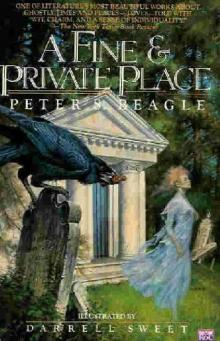 A Fine and Private Place
A Fine and Private Place Lila The Werewolf
Lila The Werewolf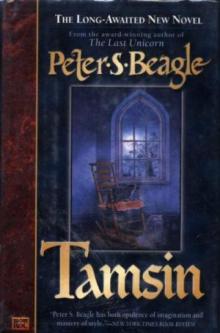 Tamsin
Tamsin Innkeeper's Song
Innkeeper's Song